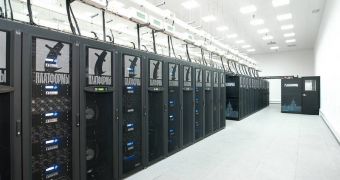GPU computing modules have already proven themselves as more than competent assets for use in supercomputers, and it looks like NVIDIA's Tesla line have found a place in a certain Russian conglomerate that is about to be upgraded.
Some problems that humanity is faced with, like diseases, the environment's degradation, etc., humans have been trying to solve by means of supercomputers.
So far, the degree of success has varied, but there is no mistaking the fact that high-performance computing clusters contribute constantly to the advancement of the human race.
Not long ago, GPU computing modules, like AMD's FireStrem and NVIDIA's Tesla series, proved they could perform specialized tasks in supercomputers, especially parallel processing ones, at very high performance levels.
Apparently, the latter have found a place in what will soon be the upgraded Lomonosov HPC system at the Moscow State University, Russia.
"Our research requires enormous computational resources, and we need to deliver this performance as efficiently as possible," said Victor Sadovnichy, academician, Rector of Moscow State University.
"The only way for us to achieve these twin goals is with a hybrid GPU/CPU based system."
The system is used to research global climate changes, ocean modeling, galaxy formation and post-genomic medicine.
That said, once the cluster is upgraded fully, it will have 1,544 Tesla X2070 GPUs, one for each quad-core CPU in the installation. Peak performance should be of 1.3 petaflops, number one in Russia and among the fastest in the world.
The Keldysh Institute of Applied Mathematics, Lobachevsky State University of Nizhni Novgorod (NNSU) and the Scientific and Educational Center of Parallel Computing at Perm State University are also using NVIDIA GPU modules in their projects.
"There is a staggering potential for GPU/CPU-based systems hybrid solutions to help us address a great number of scientific challenges such as studying living systems, bio-photonics and computational mathematics," said Victor Gergel, Dean of the computational mathematics and cybernetics department at NNSU, director of Scientific and Research Institute of Applied Mathematics and Cybernetics.
"In cooperation with NVIDIA, NNSU is able to give more of our students and researchers access to computational resources that will significantly increase the pace of their work."

 14 DAY TRIAL //
14 DAY TRIAL //